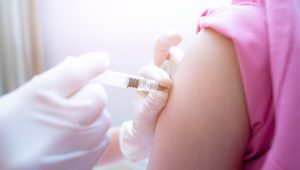Brittany Roberts MD and Allison M. Wyman MD
STI_FFHA2019
Overview
Sexually transmitted infections (STIs) are infections caused by microorganisms, including a variety of bacteria, parasites, and viruses. They are passed from person to person by different modes of sex including vaginal, anal, or oral intercourse. STIs are very common and the Center for Disease Control and Prevention (CDC) estimates 20 million new infections occur every year in the United States. Some people may have an infection without any symptoms, but there are some ways to tell if you may have a STI. These are:
- the presence of foul-smelling odor from the vagina or urine
- abnormal discharge, from male or female genitalia that can be white, yellow, green, or gray fluid
- pain with urination
- painful or painless ulcers found on or around your genital area

If you are planning to have sex, it is important to practice safe sex. This includes wearing a condom during any type of sexual intercourse. In addition to helping to prevent a pregnancy, condom use protects you and your partner from developing a STI.
There are different bacterial infections that are passed sexually. The most common bacteria causing STIs are Chlamydia, Gonorrhea, and Syphilis. Of these, the most common is chlamydia. If untreated, the main complication of an infection is the inability to become pregnant in the future. If you are pregnant with a STI, there is a chance that it could be passed to the baby. This can cause the baby to have birth defects. If you are worried that you or your partner may have a STI, it is important that you go to a doctor to be tested and treated immediately.
Chlamydia and Gonorrhea
Chlamydia and Gonorrhea are often passed together and may have similar symptoms. Symptoms include abnormal genital discharge, burning with urination, or foul odors. Many people who have these infections may not have symptoms at all.
If you are female and have untreated chlamydia or gonorrhea, this can spread to your reproductive organs including your uterus and fallopian tubes (the tubes that carry eggs from the ovary to the uterus). This may cause inflammation in your pelvis called Pelvic Inflammatory Disease (PID). Signs of PID include vaginal discharge, pelvic or abdominal pain and fever. However, PID may also be asymptomatic. For males, infection with these bacteria may be without symptoms. Or, they may cause testicular pain, pain with urination and fever.
Chlamydia and Gonorrhea can be diagnosed in a few ways. A healthcare provider might test your blood, urine, or discharge. Chlamydia and Gonorrhea are both treatable with a course of antibiotics. If you or your partner are diagnosed with one of these infections you both get treated so you don’t get the infection again.
Trichomoniasis

trichomonas vaginalis
Trichomoniasis is a very common parasitic infection. It is caused by a protozoa called trichomonas vaginalis. Most people with trichomoniasis do not have symptoms. Symptoms that may show that you are infected with trichomoniasis are:
- frothy discharge that may be clear, white, yellowish, or green, sometimes with a fishy odor
- burning with urination
- genital itchiness
- burning of the genitals
The test for a trichomoniasis infection is called a wet prep. A wet prep means swabbing the genitalia and looking at it under a microscope. A positive test will show swimming trichomonads. Patients with trichomoniasis are treated with antibiotics. It is important to treat both you and your partner so you don’t get the infection again.
Syphilis
Syphilis is a STI that is very treatable but if left untreated can cause serious problems. Early signs that you may be infected with syphilis are:
- a painless genital sore
- skin rash
- swollen lymph nodes
- flu-like symptoms
If untreated, syphilis may cause:
- heart problems
- vision problems
- difficulties walking
- memory issues
Syphilis is diagnosed by a blood test and treated with an antibiotic called penicillin. If diagnosed with syphilis when pregnant, the person must get treated because it can cause problems with the baby. It is important to tell your sexual partner(s) to get tested as well and get treated. This will protect you and your partner from reinfection.
HPV
Human Papillomavirus (HPV) is one of the viruses that can cause a STI. HPV is very common and almost everyone, including males and females, is infected at some point during their lifetime. In most cases, your body is able to clear HPV on its own. If your body is unable to clear the virus, it may cause a variety of different problems. Some strains of HPV cause genital warts, and the most severe result of untreated HPV is cancers of the vagina and cervix.
 There are different ways to prevent the progression of HPV infection to cervical cancer. One method is a vaccination called Gardasil. Gardasil is given as three shots. The CDC recommends Gardasil for males and females aged 9 to 26. The second method is a screening test called a pap smear. Pap smears start at the age of 21. During a Pap smear, a healthcare provider collects a sample of the cells of your cervix and tests them. If abnormal cells are found, the treatment options will depend on the how much abnormal cells have developed.
There are different ways to prevent the progression of HPV infection to cervical cancer. One method is a vaccination called Gardasil. Gardasil is given as three shots. The CDC recommends Gardasil for males and females aged 9 to 26. The second method is a screening test called a pap smear. Pap smears start at the age of 21. During a Pap smear, a healthcare provider collects a sample of the cells of your cervix and tests them. If abnormal cells are found, the treatment options will depend on the how much abnormal cells have developed.
Genital Herpes
Herpes Simplex Virus, or Genital Herpes, is a viral infection that causes painful ulcerations on the genitals. Unlike many of the other forms of STIs, genital herpes is not cleared by the body and cannot be treated with an antibiotic. When a person has genital herpes, they will go through periods of showing symptoms and periods without symptoms. Genital herpes is a lifelong disease. Although there are no medications to completely clear the herpes virus from your body, there are antiviral medications to help the painful blister-like ulcerations that herpes commonly causes.
To diagnose genital herpes, a blood test may be performed or a sample can be tested from the site of infection. If you may have genital herpes, it is important to discuss this with your partner so they may receive diagnosis and treatment as well.
HIV/AIDs
Human Immunodeficiency Virus (HIV) is a virus that is transmitted by blood, semen, rectal fluids, vaginal fluids, and breast milk. One of the most common ways to transmit HIV is via sexual intercourse. HIV weakens the immune system, which causes different problems in your body. Your immune system is your body’s way of defending you against infections that you encounter on a daily basis. Without your immune system, it is easy to become ill from things that healthy individuals can normally deal with. For instance, the common cold may be deadly for someone with HIV.
If left untreated, HIV can progress to its more severe form, Auto Immune Deficiency Syndrome or AIDS. There are medications that can help the body stop the progression from HIV to AIDS.
The group of people that are at highest risk of getting HIV are men who have sex with men. This is due to the higher chance of fluid exchange with anal intercourse. Having multiple sexual partners also increases the risk of getting HIV. It is important to get tested for HIV if you are having unprotected sex with multiple partners or if you think your partner may be having sex with multiple partners. This is an important discussion to have in order to be safe from not only HIV and AIDS but any sexually transmitted infection.
Common myths
- “I heard you can get a STI from a toilet seat”
- You cannot get a STI from sitting on a toilet seat. Just because your skin touches urine does not mean you will get any of the mentioned bacteria or viruses.
- “I can’t get a STI from only having unprotected sex one time”
- Even if you have unprotected sex with someone one time, you can still contract any of these STIs. All it takes is one time.
- “I’ll know if I have an STI because I’ll be able to see it”
- As discussed in the article, the majority of these STIs go without symptoms. Even if you do not notice any changes, you can still be infected with a STI.
- “If I only have anal or oral sex, I will not get a STI”
- You can still get a STI if you only have anal or oral sex. Because you are exchanging fluids that may be carrying these bacteria or viruses, there is a risk of contracting a STI by these methods as well.
- “I already had a STI, which means I can’t get it again”
- Just because you have been diagnosed and treated for a STI does not mean you cannot get it again, especially if the partner that gave you the infection is not treated too.
Take Home Points
- Sexually transmitted infections are transmitted from one individual to another via oral, anal, or vaginal intercourse.
- It is important to practice safe sex every time you have sex to protect yourself and your partner from a STI.
- STIs are caused by a variety of bacteria including chlamydia, gonorrhea, and syphilis. All of these are treated with a course of antibiotics.
- Trichomoniasis is the only parasite to cause a STI, but is also treated with antibiotics.
- The main viruses that cause STIs are Human Papillomavirus (HPV), Herpes Simplex Virus, and Human Immunodeficiency Virus (HIV).
- HPV is very common and affects most sexually active men and women. The majority of people infected with HPV will clear the viruses on their own but in some cases the virus may cause genital warts or genital cancers.
- Genital herpes is a lifelong disease that causes painful blisters in the genital region. It is not curable but symptoms may be lessened by antiviral medication.
- HIV is a serious condition that causes the immune defenses to be weakened. Untreated HIV may lead to a more serious form called AIDS.
Additional Resources
https://www.cdc.gov/std/
https://www.womenshealth.gov/a-z-topics/sexually-transmitted-infections
https://www.medicalnewstoday.com/articles/246491.php
References
- Centers for Disease Control and Prevention. Sexually Transmitted Disease Surveillance 2016. Atlanta: U.S. Department of Health and Human Services; 2017.
- Detels R, Green AM, Klausner JD, et al. The incidence and correlates of symptomatic and asymptomatic Chlamydia trachomatis and Neisseria gonorrhoeae infections in selected populations in five countries. Sex Transm Dis 2011; 38:503.
- Meites E, Gaydos CA, Hobbs MM, et al. A Review of Evidence-Based Care of Symptomatic Trichomoniasis and Asymptomatic Trichomonas vaginalis Clinical Infectious Diseases: An Official Publication of the Infectious Diseases Society of America. 2015;61(Suppl 8):S837-S848. doi:10.1093/cid/civ738.
- Hall HI, Song R, Rhodes P, et al. Estimation of HIV Incidence in the United States. JAMA : the journal of the American Medical Association. 2008;300(5):520-529. doi:10.1001/jama.300.5.520.
Author Information

Dr. Brittany Roberts is a first year Obstetrics and Gynecology resident at the University of South Florida Morsani College of Medicine. She went to the University of Florida for undergraduate education and Florida International University College of Medicine for medical school. She is hoping to pursue a career in Urogynecology and Female Pelvic Floor Reconstruction Surgery.
No conflicts of interest to report.

Allison Wyman, MD, FACOG is an Assistant Professor of Female Pelvic Medicine Reconstructive Surgery, Department of Obstetrics and Gynecology at Morsani College of Medicine, University of South Florida located in Tampa, Florida. She completed her residency in Obstetrics and Gynecology at University Hospitals Case Medical Center/Case Western Reserve University School of Medicine, followed by a three-year fellowship in Female Pelvic Medicine and Reconstructive Surgery at the University of South Florida.
No conflicts of interest to report.






